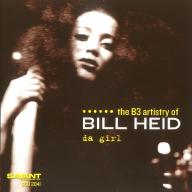On occasion he would sit in with some of these groups and pester them for information. Spending time in Chicago and later in New York, he met and hung out with his mentor, Larry Young, often visiting the family-owned Newark Club in Young's hometown of Newark, NJ. He was also privy to playing with the best organ drummers like Joe Dukes and Billy James. And he heard the local contingent of jazz greats like Ahmad Jamal, Art Blakey, Erroll Garner, George Benson, Eddie Jefferson, Mary Lou Williams, and Stanley Turrentine.
His quest for musical knowledge found him on the road when in 1963, in search of rare 78-rpm rhythm & blues records, he began a journey/career of hitchhiking. He did this in the contiguous 48 states of the U.S.; through Canada, Mexico, the Philippines, Japan, Korea, and China; and to the Thailand/Cambodia border. His over 400,000 documented miles of thumbing a ride gained Heid a spot in -The Guinness Book of World Records. Some of his journeys led him to the so-called chicken houses and organ rooms of major cities, where he interned with Jimmy Witherspoon, Jimmy Ponder, Sonny Stitt, Grant Green, David Fathead Newman, Ira Sullivan, and Mickey Roker, and was a pianist with Don Patterson.
A move to Chicago brought him closer to the urban blues as he worked or recorded with Muddy Waters, John Lee Hooker, and especially Son Seals, Koko Taylor, Fenton Robinson, and Roy Buchanan. He also did two LPs and played in the bands of contemporary jazz guitarist Henry Johnson. Moving to Detroit, he spent two decades there playing in his own groups; helping to revive the career of a local legend of blues guitar and vocals, Johnnie Bassett, as the music director of his Blues Insurgents; and backing the veteran singer Alberta Adams. During and since his time in Detroit, Heid could be found making music soundtracks for adult films in Los Angeles, then touring worldwide for the U.S. State Department as a jazz ambassador, particularly on tours of Japan and Vietnam. In August 2003, Heid played more of the Pacific Rim in Sri Lanka, Indonesia, Malaysia, and Singapore.
Upon moving back to the Eastern United States, he could be heard on organ and piano engagements at various venues in the Washington, D.C., area. Of his mindset, Heid was quoted as saying "I can't live a day without playing 1-4-5s," incorporating those standard blues changes with cool McCoy Tyner minor riffs, vicious funk songs in Japanese, and what he calls Talifunk. "I approach this thing like total war and have been lucky to have avoided a day job." His hip vernacular, unique vocal language, and risqué sense of humor, melded with his passion for baseball, have made him an entertainer nonpareil. ~ Michael G. Nastos, Rovi


















